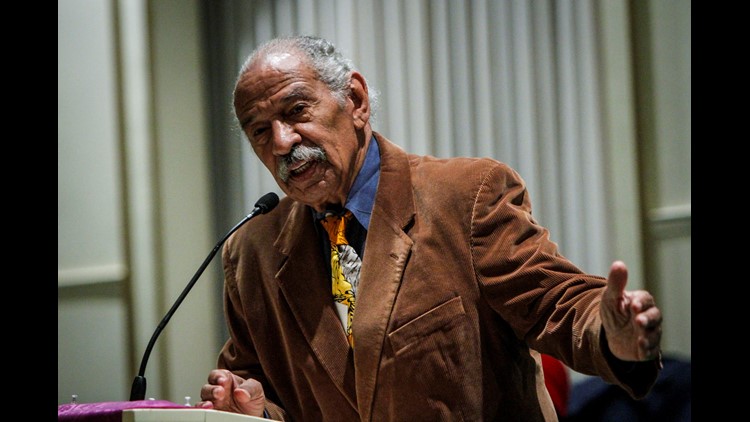Facing a rising chorus of voices demanding he step down because of sexual harassment claims, U.S. Rep. John Conyers Jr., D-Detroit, will leave the seat he has held for more than five decades, a swift and crushing fall from grace for a civil rights icon and the longest-serving active member of Congress.
Saying he was finalizing his plans for retirement, Conyers added he would endorse his son, John Conyers III, to replace him Congress.
"My legacy can’t be compromised or dimished in any way by what we’re going through now. This too shall pass. … My legacy will continue through my children," Conyers told Mildred Gaddis on her Detroit radio show.
As for the accusations against him, Conyers said, "They're not accurate, they're not true and they're something I can't explain where they came from."
Conyers, 88, is retiring two weeks after an article on BuzzFeed.com detailed a secret settlement of more than $27,000 with a former staffer who accused him of making sexual advances toward her and paying her out of funds from his taxpayer-supported office.
By Thanksgiving, several other women had come forward with accusations against Conyers, who, despite his express denials that he harassed anyone, saw House leaders and members of his own party abandon him, with three of the four Democrats in the Michigan delegation call for him to resign last Thursday.
In addition to Marion Brown, the staffer who received the settlement, at least six other women claimed they either experienced or saw him touching and rubbing women in his office, making sexual advances toward them or making inappropriate remarks. The most recent, Elisa Grubbs, made accusations against Conyers on Monday night, saying in a statement that Conyers put his hand up her skirt at a church, among other allegations.
Among the others, one filed a lawsuit against him early this year and then withdrew it, saying she didn't want to hurt Conyers' reputation. Another woman, Washington lawyer Melanie Sloan, also told the Free Press last month that Conyers had verbally mistreated her, forced her to babysit his children and, on one occasion, showed up at a meeting with her at his office in his underwear —though she didn't consider it sexual harassment.
As late as Tuesday morning, there were reports that Conyers would fight on, choosing to remain in office til the end of his current term and then retire in early 2019. But speaking on Mildred Gaddis' show on WPZR-FM (102.7), Conyers said he was resigning.
From accusation to resignation, Conyers' colleagues in Congress went from being warily supportive, urging caution while an investigation by the House Ethics Committee was completed to issuing outright calls for his resignation, even from at least one fellow member of the Congressional Black Caucus, which he helped to create in 1971.
U.S. Rep. Jim Clyburn of South Carolina, who is the third-ranking Democrat in the House and has been a colleague of Conyers' on the Congressional Black Caucus since 1993, called for him to resign Thursday shortly after similar calls by House Speaker Paul Ryan and Democratic Leader Nancy Pelosi. In Michigan, U.S. Reps. Dan Kildee, D-Flint Township, Debbie Dingell, D-Dearborn, Sander Levin, D-Royal Oak and Bill Huizenga, R-Holland, joined in the chorus of calls for Conyers to step aside.
Conyers' lawyer, Arnold Reed, of Southfield, had reiterated on several occasions that the congressman was not ready to resign and wanted to see the Ethics investigation —which he said he would cooperate with —- completed.
More than 200 supporters, including some of Detroit's most influential political, religious and civil rights leaders, gathered in Detroit on Monday to reiterate that message saying that Conyers should get the same due process rights as any other member of Congress and President Donald Trump who also are currently accused of sexual harassment.
But less than week after the claims first surfaced, with allegations swirling not only over the harassment claims but his use of taxpayer funds to pay at least one settlement, he abruptly stepped down as the ranking Democrat on the House Judiciary Committee, a position he had held for more than two decades.
With media reports that some members of the caucus were privately urging him to resign — he suddenly quit Washington, missing several votes last week, including one mandating sexual harassment training for members, as he headed back to Detroit and his family.
On Wednesday night he was hospitalized, his lawyer saying he believed it was stress-related. Then came the louder calls for him to resign, which finally culminated with the accusations —- many of them graphic and involving him groping or asking staffers for sex — ending Conyers' storied career.
It was a remarkable 53-year-run during which Conyers, the son of a well-known labor lawyer in Detroit, compiled a near-record legacy of civil rights activism, longevity and advocacy for the poor and underprivileged.
He retires with the sixth-longest tenure in congressional history.
A long record of fighting for civil rights and social justice
Conyers was born in Detroit and graduated from Northwestern High School. After a tour of duty with the U.S. Army during the Korean War, Conyers returned home to bachelor's and law degrees from Wayne State University.
His law practice and work in the auto plants in Detroit led him to the office of former U.S. Rep. John Dingell, D-Dearborn, where he worked as a legislative assistant for three years. But by 1964, at the age of 35, Conyers went after a seat of his own in Congress, winning the first of 27 general elections and serving portions of Detroit and some surrounding Wayne County suburbs for the next five decades.
He may not have had many bills that carried his name — only 26 of the 712 bills he has introduced have become law, according to the Library of Congress — but he fought for issues of civil rights and social justice, including seeking reparations for the descendants of African-American slaves, modifying the mandatory sentences for those convicted of non-violent drug crimes, defending assaults on the Voting Rights Act, reforming laws that put juvenile offenders in prison for life and calling for investigations into police brutality of African-American men.
And he was the key sponsor of the bill, introduced each session for 20 years, that designated the third Monday of January as a federal holiday in honor of Martin Luther King Jr. Conyers introduced the bill four days after King was assassinated in 1968, but it wasn’t signed into law until 1989.
In the thick of the civil rights battles, Conyers walked alongside King and other leaders of the movement in Selma, Ala., to bring equal voting rights to blacks.
In 2015, during his 50th year in Congress, Conyers told the Washington Post that King was one of the most important historical figures in history.
"I felt the civil rights movement was a powerful chapter in American history, King to me is the outstanding international leader of the 20th century without ever holding office," he said. "He advanced us forward even though there was a terrible loss of life and violence and injustice. But Martin Luther King Jr. moved us in a way that changed history."
He moved among those involved in the disturbance in Detroit in August 1967, urging calm. And he burnished his civil rights record even more by hiring icon Rosa Parks after she moved from Alabama to Detroit. The secretary and receptionist job in Conyers' Detroit office was a job she held until her retirement in 1988.
But now, as Conyers faced the biggest threat of his political career — claims of sexual harassment, verbal abuse of employees and misuse of taxpayer funds to cover up those claims — all the fights he waged weren't enough to save his seat.
It was an ignoble and heartbreaking moment for Conyers.
"It has taken a toll on the congressman and it remains increasingly difficult for him without the support in Washington," his attorney, Arnold Reed, told Detroit Free Press columnist Rochelle Riley during a radio interview on Tuesday.
Denying the sexual harassment allegations
Conyers continued to refute the allegations against him, admitting the settlement with Brown, but denying her claims of sexual harassment. He also denied the claims the other former staffers made against him and enjoyed the support of a dozen former employees who signed a letter to defend their boss.
During his time in office, which he won with huge margins ever two years like clockwork, Conyers was considered one of the most liberal members of Congress, with a 100% rating from the American Civil Liberties Union, Planned Parenthood and the Human Rights Campaign.
The conservative Freedom Works gave him a 15% rating, while the Club for Growth and Americans for Prosperity give him ratings of 8% and 6% respectively.
Conyers, however, had already come under scrutiny twice from the House Ethics Committee in Congress for possible transgressions in his office.
As recently as this summer, the committee confirmed it was continuing to look at whether he had wrongly paid his former chief of staff more than $50,000 for time she didn't work. Conyers said he was only paying her for accrued leave time and severance as part of a separation agreement reached after she pleaded guilty to a misdemeanor charge of receiving stolen property unrelated to her job.
In 2003, the Free Press reported on complaints from six unnamed Conyers aides who said they were forced to work on various campaigns, including a failed legislative campaign for Conyers' wife, Monica, on government time. A follow-up Ethics Committee report, however, focused on allegations that the congressman used staff to babysit his sons, help his wife with her law studies and chauffeur him to private events.
Conyers' office denied the accusations and eventually reached a deal to ensure staff knew where their responsibilities began and ended.
In 2014, Conyers nearly didn’t get the chance to run for reelection because of irregularities in the petitions he filed to run for office. Wayne County Clerk Cathy Garrett said he had used ineligible people to gather signatures, but a federal court disagreed and the state Legislature passed a law that people who collected signatures didn’t need to be registered voters.



